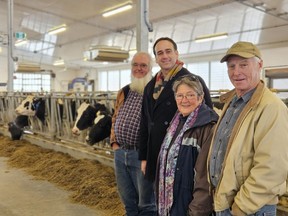1 We plough the fields and scatter the good seed on the land,
but it is fed and watered by your almighty hand;
you send the snow in winter, the warmth to swell the grain,
the breezes and the sunshine, and soft refreshing rain.
All good gifts around us are sent from heaven above;
we thank you, God, O holy God, for all your love.
As a 24-year-old I spent four months in Kingston Penitentiary, a maximum security prison toured and admired by Charles Dickens in the 1840s but a bleak place in the late 1970s. Fortunately I went home every day because I was working there as a chaplain intern and got time off for good behaviour.
There was a signficant learning curve during my chaplaincy that included daily visits to prisoners in "The Hole", the grim solitary confinement cells. There was an "older" guard (probably in his 50s) who was helpful for such a greenhorn and whose perspective made a lasting impression. He told me about the prison farm that had once been extensive, beyond the Prison for Women, across the street from KP on the property now occupied by the west campus of Queen's University. Prisoners could apply to work on the farm and this guard was convinced that this sort of outside labour made a signfiicant difference to the inmates lives, including their attitudes inside.
Elsie, Bossie, and their Posse
This farm had closed by the time I working at the Pen but other prison farms still existed. You may recall that they were closed by the Harper government in 2009 even though they were profitable enterprises with prize dairy herds One of the arguments was that they didn't result in usable skills, even though hundreds of thousands work in agriculture across the country and Canada allows many foreign workers in for this sector every year.
There were protests against these closures and even some arrests. A lauded documentary was created about this short-sighted decison called Til the Cows Come Home (why isn't it rated on Rotten Tomatoes?) Years ago I spoke with one of the producers who gave me a copy of the film in the days before streaming --remember DVDs?
Here is the happy news. The Liberal government promised to restore these farms and while it has taken a decade or more it has happened, at least partially. In the midst of so much bleak news I find this moo-ving (someone stop me). Yes, I understand that these aren't the same cows, but lets not go there.
Here are excerpts from Kingston Whig Standard piece from a couple of days ago about the official re-opening. The 14-year-old arrested in 2010 will be in her late 20s now and I hope that she's celebrating.
A 'dairy' happy ending: Kingston prison farm running at full capacity after more than decade-long saga
Dairy operations had a full complement of milking cows by the end of December and currently is at 92% of its milk quota versus production
The cows have officially come home. And it’s a pretty spectacular sight.
Joyceville’s dairy barn, a huge and arduous work-in-progress, seemed impossible back in August 2010 when cattle were removed from Collins Bay Penitentiary property and the federal prison farms program shuttered.
On this day, cattle of all ages are resting and eating in stalls inside a state-of-the-art barn, awaiting the next milking.
It’s a stark contrast to August 2010, when police arrested more than 20 protesters, in some cases dragging away and cuffing them or forcing them to the ground when protesters sat or stood through pelting rain for more than six hours, blocking the cattle trucks from getting into the prison property after the shuttering of the program. The arrested protesters — ranging from a 14-year-old girl taken into custody with her mother, to an 87-year-old woman and several professors from Royal Military College — who were charged with mischief. Several organizers were arrested...
The sprawling dairy operations feature a full-time farm supervisor and herdsman, as well as two dairy herdsmen with 12 hours shifts, seven days a week. At present, there are 20 offenders on job assignment to agri operations, from milking crew, day farm hands, to a combination of both depending on other program responsibilities they have within the Institution.




5 comments:
David, you didn't steer us in the wrong direction with this blog. I think anyone who opposes these farms is udderly misteaken. Sorry, but you started it, David.
Dairy, dairy funny, Roger. Keep up the good work.
Many of the inmates of some of the farms were in envy of the animals and at other places they tried to let the animals free because of the awful conditions. 2 sides.
I suppose it just makes sense that there wasn't uniformity in conditions, depending on the institution. The Joyceville dairy herd was prize-winning and I've listened to interviews with inmates who worked there. Thanks Laurie.
Joyceville was one of the best. Frontenac/Collin's Bay was not as good. It had up and down years- really depended on the guards. If the guards were people who had a heart, it was good, but that didn't happen very much. Guards at jails tend to be bullies with a huge chip on their shoulders. Mean to the inmates and the farm animals.
Post a Comment